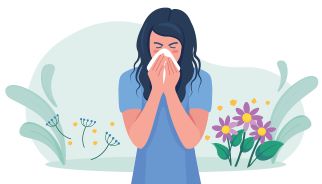April 2024
5 Things to Know About Pollen and Allergies
Do you track pollen counts like some people track their favorite sports team’s stats? About a quarter of all U.S. adults report experiencing seasonal allergies, also known as hay fever, and it can be a major nuisance during some of the nicest times of the year.

You may be surprised to learn that pollen itself isn’t causing your symptoms. Your sneezing, runny nose, watery eyes, and itchy throat occur when your immune system thinks that pollen is a dangerous invader. It releases a chemical called histamine to fight pollen, which results in an onslaught of symptoms. When you suffer from a pollen allergy, that’s just 1 important fact to know. Here are 5 more.
1. There are many different plants that release pollen.
Ragweed gets a lot of the blame, but there are many different plants that release pollen. Other common sources of weed allergies are sagebrush, pigweed, lamb’s quarters, and tumbleweed. Trees, including birch, cedar, and oak, also release pollen that can trigger your symptoms. When you have a pollen allergy, your symptoms only occur when the type of pollen you’re allergic to is in the air. So even if the overall pollen counts are high, it’s only an issue for you if the type of pollen you’re allergic to is present.
2. You should start taking your allergy medicine before symptoms strike.
Ideally, start taking your medicine before you expect symptoms to ramp up. This helps prevent your body from releasing histamine. Talk with your healthcare provider about the best time to start taking your medicines.
3. You can take steps to reduce your allergy symptoms.
Your best defense is reducing your exposure to pollen as much as you can. Some ways to do that include:
-
Staying inside as much as possible when pollen counts are high
-
Keeping your windows closed and using air conditioning with a HEPA filter
-
Taking a shower before going to bed each night to remove pollen from your hair and skin
-
Washing your bedding in hot water once a week
-
Wearing sunglasses to keep pollen out of your eyes
-
Changing your clothes as soon as you come indoors after being outside
4. Sometimes you need more than medicine.
While there are many different over-the-counter and prescription medicines available to treat your symptoms, many people find they don’t make allergies disappear completely. If this sounds familiar, then you may be a candidate for immunotherapy. This is a technique in which you’re exposed to small amounts of an allergen, either through allergy shots or a tablet you place under your tongue, to help make your immune system less sensitive to it. Ask your provider if immunotherapy is an option for you.
5. Your allergy symptoms are better when it’s wet outside.
Rainy weather may ruin your outdoor plans, but it can be a boon for your allergy symptoms. On rainy, cloudy, and windless days, pollen doesn’t move around very much. However, hot, dry, and windy weather can sweep more pollen into the air and stir up your symptoms.
Working with an allergist, you can find out what specifically you’re allergic to and develop a treatment plan that can help control your symptoms.